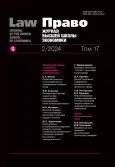Foreign Experience in Legal Regulating Deepfake Technology
- Авторлар: Vinogradov V.1, Kuznetsova D.1
-
Мекемелер:
- National Research University Higher School of Economics
- Шығарылым: Том 17, № 2 (2024)
- Беттер: 215-240
- Бөлім: Law in the Modern World
- URL: https://journal-vniispk.ru/2072-8166/article/view/317744
- DOI: https://doi.org/10.17323/2072-8166.2024.2.215.240
- ID: 317744
Дәйексөз келтіру
Толық мәтін
Аннотация
Deepfake technology has been gaining rapid popularity in recent years, developing at an extraordinary speed. With the help of various applications, anyone can create a photo, video or audio deepfakes on their own and without much difficulty. At the same time, their use raises various ethical issues related to misinformation and consent, and creates a risk of misuse, for example, in the sphere of politics, in various fraudulent schemes. All this indicates the need to build adequate models of legal regulation of deepfake technology, to create a system of acts aimed at protecting human rights, including in the digital environment, and preventing improper use and commission of offences using this technology. At the same time, the deepfake technology can also be used for good purposes, it poses a very difficult task for the legislator to find a balance — it is necessary to fix an effective system of rules for the use of the deepfake technology and responsibility for their violation, without creating difficult to overcome obstacles to the development of technology in general or, without prohibiting the use of deepfake technology completely. The article reviews the experience of the USA, China and Singapore in the sphere of legal regulation of the deepfake technology in order to find the most successful model. Despite all the differences, the approach of the USA and China is similar in terms of adopting specialized regulation, while Singapore is moving in a different direction — adopting point changes to legislation and addressing issues through extensive enforcement. In any case, it can be stated that the legislative measures of all countries reflect the desire to adapt their legal systems to the challenges posed by emerging digital technologies. The reviewed experience (if it will be taken into account and adapted) may be useful for the creation of an optimal Russian model of legal regulation of the deepfake technology. It is thought that labelling all types of deepfake content is the key solution.
Негізгі сөздер
Авторлар туралы
V. Vinogradov
National Research University Higher School of Economics
Email: vavinogradov@hse.ru
ORCID iD: 0000-0001-8490-2893
D. Kuznetsova
National Research University Higher School of Economics
Email: dvkuznetsova@hse.ru
ORCID iD: 0009-0003-4059-865X
Әдебиет тізімі
- Batoev V.B. (2023) Using “deepfake” technology in operational-search activities. Juridicheskaya nauka i praktika. Vestnik Nizhegorodskoi akademii MVD=Legal Science and Practice: Bulletin of the Nizhny Novgorod Academy of Internal Ministry, no. 1, pp. 70-76 (in Russ.)
- Blitz M.J. (2020) Deepfakes and other non-testimonial falsehoods: when is belief manipulation (Not) First Amendment speech. Yale Journal of Law & Technology, vol. 23, Fall, pp. 161-300.
- Burnham W. (2006) Legal system of the USA. Moscow: New Justice, 1216 p. (in Russ.)
- Chng K. (2023) Falsehoods, foreign Interference, and compelled speech in Singapore. Asian Journal of Comparative Law, no. 2, pp. 235-252.
- Goodfellow I.J. et al. (2014) Generative adversarial nets. In: Advances in Neural Information Processing Systems. Montreal: University Press, pp. 2672-2680.
- Hine E., Floridi L. (2022) New deepfake regulations in China are a tool for social stability, but at what cost? Nature Machine Intelligence, no. 4, pp. 608-610.
- Joost L. (2023) Place for illusions: deepfake technology and the challenges of regulating unreality. University of Florida Journal of Law and Public Policy, vol. 33, no. 2, pp. 309-332.
- Kobis N.C., Dolezalova B., Soraperra I. (2021) Fooled twice: people cannot detect deepfakes but think they can. iScience, vol. 24, issue 11, p. 103364.
- Kosikhina S.S., Shvets A.V. (2022) Legal system of the PRC: textbook. Blagoveshchensk: Amur State University, 90 p. (in Russ.)
- Troshchinsky P.V. (2016) Legal system of China. Moscow: Nauka, 472 p. (in Russ.)
- Lee H., Lee T. (2023) Between two Acts: competing narratives, activism and governance in Singapore's digital sphere. Internet Histories, vol. 7, no. 4, pp. 295-312.
- Li Y. (2023) Implementing rule of law concept in the digital sphere: China's experience. Legal Issues in the Digital Age, no. 4, pp. 114-133.
- Manique A.E. et al. (2023) Industry approaches in handling online exploitation of children: a comparative study of policy, guidelines and best practices in Malaysia, Singapore and Australia. Cogent Social Sciences, no. 2.
- Pfefferkorn R. (2020) “Deepfakes” in the courtroom. Boston University Public Interest Law Journal, vol. 29, no. 2, pp. 245-276.
- Skibba R. (2020) Media enhanced by artificial intelligence: can we believe anything anymore? Engineering, vol. 6, issue 7, pp. 723-724.
- Soon J. (2022) A comparative analysis of legislative protection from harassment: a view from Singapore. Oxford University Commonwealth Law Journal, no. 2, pp. 177-204.
- Young N. (2019) Deepfake technology: complete guide to deepfakes, politics and social media. North Charleston (S.C.): Independently published, 160 p.
Қосымша файлдар








